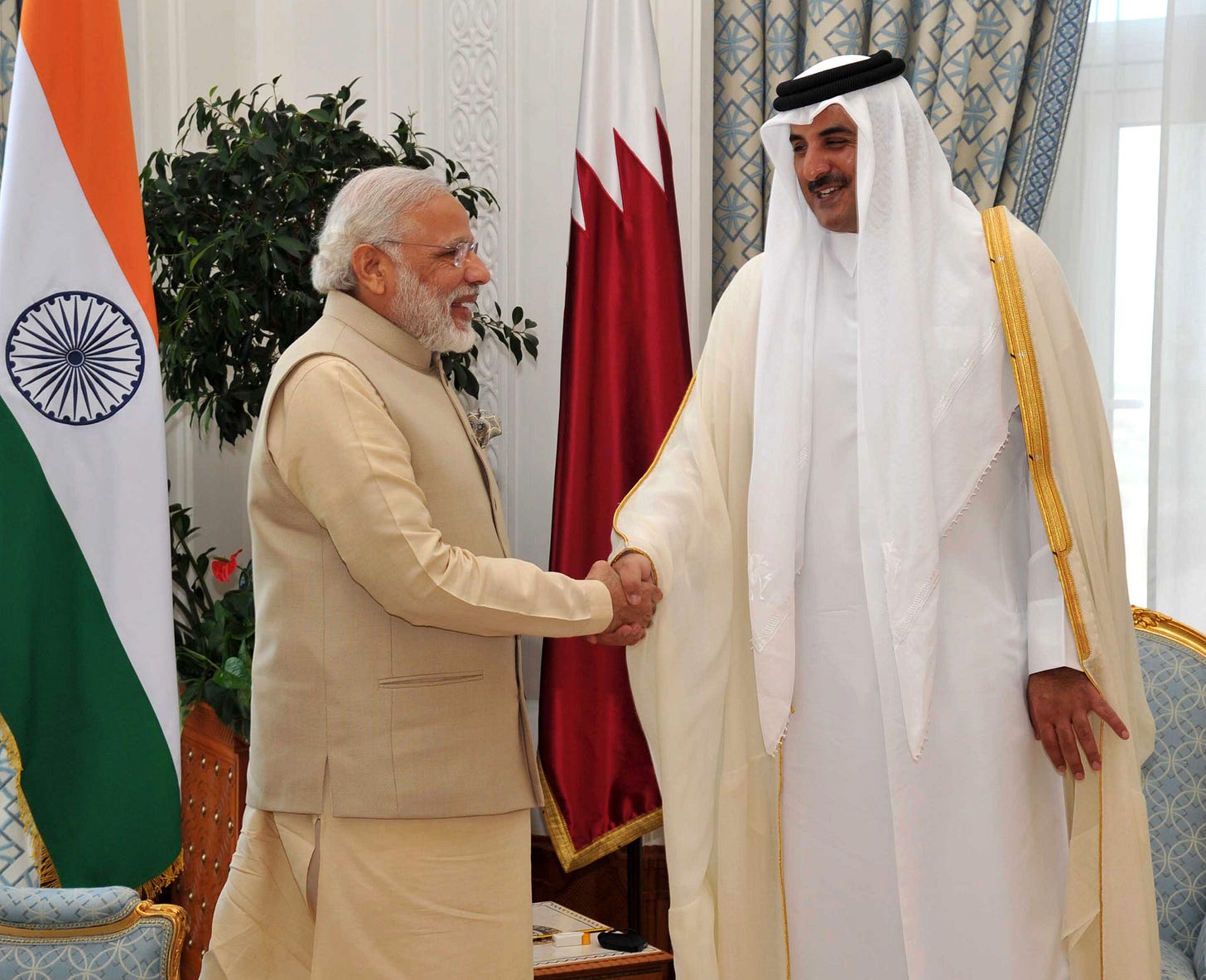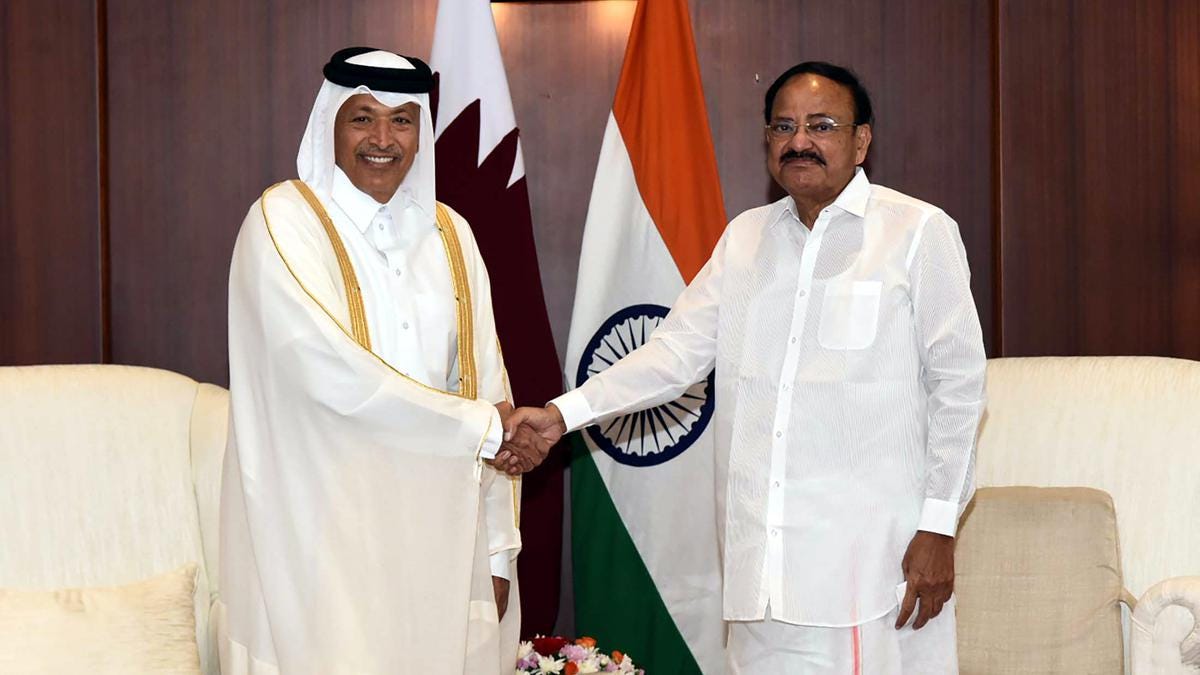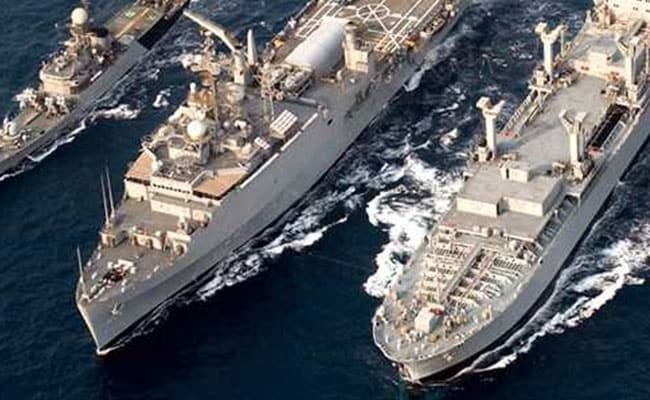Qatar Releases 8 Ex-Indian Navy Men Sentenced to Long Terms after Commuting of Death Penalty: The Breaking Story
Seven of them of have already returned to India. Major breakthrough on the eve of PM Modi inaugurating the BAPS Hindu Temple in Abu Dhabi on 14th February.
Diplomatic Triumph: India Secures Release of Ex-Navy Personnel from Qatar
In a significant diplomatic achievement, India's Ministry of External Affairs successfully negotiated the release of eight former Indian Navy personnel detained in Qatar, just before Prime Minister Narendra Modi's imminent two-day visit to the United Arab Emirates (UAE) on February 13-14. The Indian nationals, arrested on August 30, 2022, and initially sentenced to death last October—a penalty later commuted to lengthy prison terms—were welcomed back by India on February 12.
High-Level Intervention Facilitates Swift Release
Sources close to the matter credit a direct dialogue between Prime Minister Modi and the Emir of Qatar for the expedited release, bypassing conventional diplomatic routes that could have extended the process. The Ministry of External Affairs, Government of India, announced early on February 12 that seven of the veterans have already returned to Indian soil.
Qatar's Mediating Role and Relations with India
The strategically positioned small Arabian Gulf nation of Qatar, renowned for its mediation roles in international disputes, including facilitating hostage negotiations between Israel and Hamas with the involvement of the US, has recently experienced a dip in its relations with India. Nonetheless, this act of goodwill comes as Prime Minister Modi is scheduled to inaugurate the magnificent BAPS Hindu Temple in Abu Dhabi, UAE on 14th February, underlining the event's geopolitical importance.
India's Reaction and Future Implications
The Indian Government expressed its gratitude for the Amir of Qatar's decision, which marks a positive turn in India-Qatar relations previously strained by the detention of the Dahra Global employees. This development not only brings relief to the affected families but also enhances India's diplomatic stature in the Arab Gulf, where India has strong economic and labor ties.
The release, originally anticipated ahead of Ramzan or Eid, underscores India's growing influence and the effectiveness of its foreign policy, particularly in the lead-up to the Lok Sabha elections. With around 750 Indian prisoners still in Qatar, this incident may also pave the way for further diplomatic engagements aimed at protecting the rights and welfare of Indian nationals abroad.
Recapitulation (29th October, 2023)
In a startling development that has rattled India's diplomatic circles, eight former Indian Navy personnel have been sentenced to death by a judicial court in Qatar. The Ministry of External Affairs (MEA) has termed the verdict "deeply shocking" and is reportedly pursuing all possible avenues, both formal and informal, to secure the safe return of these Indian nationals.

Who Are The Sentenced?
The eight individuals awarded death penalty have had distinguished careers in the Indian Navy. Their areas of expertise range from navigation and engineering to communications and gunnery. Most had served in the Navy for up to 20 years and held important positions.
Who Are These Men?
Captain Navtej Gill (Retd): A highly decorated officer hailing from Chandigarh, he served notable appointments, including navigating officer at INS Viraat.
Commander Sugunakar Pakala (Retd): An engineering officer, he holds the unique record of crossing the equator twice aboard INS Tarangini.
Captain Saurabh Vashisht (Retd): An engineering officer with multiple commendations from the Commander-in-Chief.
Commander Purnendu Tiwari (Retd): A navigation specialist who received the Pravasi Bharatiya Samman award in 2019.
Captain BK Verma (Retd): A navigation specialist, he was a topper at the Staff College course.
Commander Amit Nagpal (Retd): Specialised in communications during his tenure in the Navy.
Commander SK Gupta (Retd): Specialised in Gunnery.
Ragesh: The only non-commissioned officer among them; served as a sailor in the Navy.
What Were They Doing in Qatar?
These men were employed by Dahra Global Technologies and Consultancy Services1, a private company contracted to train the Qatari Naval staff. However, they were arrested on espionage charges, a crime that carries the death penalty in Qatar. It remains unclear whether the firm's top management or its CEO, Khamis Al-Ajmi, has also been held accountable.

Diplomatic Relations Between India and Qatar
Prime Minister Narendra Modi and the Emir of Qatar, Sheikh Tamim Bin Hamad Al Thani, enjoy a strong personal rapport that serves to further strengthen the robust diplomatic relations between India and Qatar. These ties are fortified by substantial economic partnerships and mutual respect for each other's sovereignty.
Additionally, Qatar has been an influential peace broker on the global stage, notably securing the release of two American hostages from Hamas in Gaza2. Given this positive backdrop and Qatar's history in diplomatic resolutions, the harsh sentencing of Indian nationals is a particularly unexpected and unsettling development. However, the strength of these cordial relations and Qatar's role in peace brokering provide a glimmer of hope that the death sentences may not be carried out, leading to a satisfactory resolution for all stakeholders.
Lessons to Be Drawn
1. Due Diligence is Crucial
Individuals with defence backgrounds working abroad, particularly in fields related to security and defence, should exercise extreme caution. Due diligence before accepting any assignment is imperative to avoid falling into legal and diplomatic traps.
2. Dilemma of Self-reliance
For cash-rich countries like Qatar aiming to develop indigenous defence capabilities, recruiting foreign expertise may be the only viable option. However, this approach carries inherent risks, such as potential leaks of sensitive information to hostile powers. This issue is particularly pressing given Qatar's precarious geopolitical position in the volatile Persian Gulf.
3. Diplomatic Proactivity Needed
The Indian mission in Qatar could arguably have been more proactive. They might have provided legal assistance during the trial stage, thereby possibly influencing the outcome in a more favourable direction for the accused.
Peripheral Thoughts
While it's easy to point fingers post-facto, the situation calls for a balanced, strategic approach to secure the release of the eight personnel. Given the gravity of the situation and the irreversible nature of the death sentence, all diplomatic channels should be utilised to bring these men back to Indian soil.
One can only hope that the long-standing good relations between India and Qatar can pave the way for a re-evaluation of the case and that a more lenient penalty may be considered. On the other hand, if the charges are substantiated, it will be a difficult road ahead for all parties involved.
This incident serves as a wake-up call not just for the individuals who opt for overseas assignments in sensitive sectors but also for the government’s diplomatic missions that need to be more vigilant in safeguarding the interests of their citizens abroad.
Addendum/ Epilogue

A Closer Look at India-Qatar Diplomatic Relations (Exclusive Input)
A well-informed expert in Foreign Affairs, who opted to remain anonymous, reached out, after perusing our article, to provide deep insights into the increasingly bristled diplomatic relationship between India and Qatar.
The relationship, he stated, took a downward turn during Vice President Venkaiah Naidu's visit to Doha from 4 to 7 June 2022. At this time, Nupur Sharma, a spokesperson for India's ruling Bharatiya Janata Party (BJP), had made incendiary remarks about Prophet Muhammad (PBUH). This led to the abrupt cancellation of Mr Naidu's key activities in Doha, including a dinner meeting with Qatar's Deputy Emir and a planned press conference, leaving a lasting shadow on bilateral relations for the past year.
Furthermore, the source highlighted that Qatar often utilises media platforms like Al Jazeera Arabic to spotlight incidents of alleged anti-Muslim violence in India and to articulate a contentious position on the Kashmir issue. The prior Indian Ambassador to Qatar, who now serves as Joint Secretary in the Prime Minister's Office, made concerted efforts to stabilise these relations. However, our source cautions that the efficacy of the Foreign Ministry wanes significantly once intelligence agencies get involved, adding layers of complexity to an already intricate diplomatic milieu.
The situation, he went on to elucidate, is further complicated by Qatar's alignment with groups like Hamas and the ongoing conflict between Israel and Gaza. While the Court of Cassation in Qatar offers a venue for legal appeals, the source was sceptical about the likelihood of a favourable ruling. Drawing upon the analogous experiences of a previous Indian ambassador to the UAE, the source emphasised that even strong diplomatic relationships are not a panacea for resolving complex geopolitical issues, where death penalty is involved.
In closing, the expert noted that despite Qatar's absence of democratic institutions and a transparent rule of law, the Emir retains the ultimate power to issue pardons. Exercising this authority would likely necessitate direct intervention from India's Prime Minister, or at the very least, the National Security Advisor.
Another Insightful Comment
Another perceptive comment, which I've included below with only minor editing, was formally presented in our main article. Whether or not you find yourself in agreement with the viewpoint, it undoubtedly offers a deep and intriguing perspective.
“My assessment is that the relationship between India and GCC countries has evolved. What was once a relationship rooted in mutual respect and admiration has increasingly become one of convenience. Arab intellectuals have grown more cautious, questioning India's intentions.
“As for the espionage charges, they have cleared the first stage of judicial review, with two more appellate rounds remaining. The influence of bilateral relations, whether warm or otherwise, cannot be dismissed. The King will have the final say when considering an appeal for mercy. My expectation is that he would likely grant a pardon, but not without making a strategic point. Should this happen, Prime Minister Modi will likely leverage it during elections as a display of successful diplomacy with Qatar. Conversely, if a pardon is not granted, which seems unlikely, the situation could be used to subtly fuel a campaign against a specific community. It's unfortunate that our foreign policy has increasingly become an extension of domestic political strategies.
“On a lighter note, it's worth mentioning that Arabs prefer not to use the term 'Persian Gulf'; they are much more inclined to call it the 'Arabian Gulf'.”
Summing Up: To fresh beginnings
The successful resolution of this diplomatic impasse not only clears a significant thorn from the side of India-Qatar relations but also heralds a new era of constructive engagement between the two nations. As Prime Minister Modi is set to inaugurate the splendid BAPS Hindu Temple in Abu Dhabi, UAE, this event symbolizes more than just a landmark moment in diplomatic achievements; it underscores the potential for enhanced cooperation and mutual respect in the complex tapestry of international relations. This development promises to pave the way for a deeper, more meaningful partnership, reflective of shared interests and mutual aspirations, as both countries look forward to writing a new chapter in their bilateral story.
Dahra.com is their web-site.
Qatar's Quintessential Diplomacy: Diffusing Flashpoints Between Sworn Enemies
The Qatar-Hamas Mediation In a significant development that has captured global headlines, two American hostages were recently released by Hamas, the Palestinian organization labelled as a terrorist group by the United States and the European …







y, Congratulations to the families . A tremendous achievement by Indian foreign affairs team known for successfully helped Indians stranded in bad situations or wrongly implicated on multiple occasions. The role and involvement Prime Minister Modi must be acknowledged and appreciated. Time for opposition hawks to demonstrate grace & unification when it comes to our citizens.
One needs to be very careful while accepting employment more so if it is in defense or security related areas. The legal and justice system in most these Middle East countries is opaque. Your ability to defend is very little. Lastly , you are treated like second class citizens and foreigner. Qatar in the long run will have hard time attracting talent and resources to build and complete ambitious defense related projects. Chinese and Americans have been watching this story and will think twice .